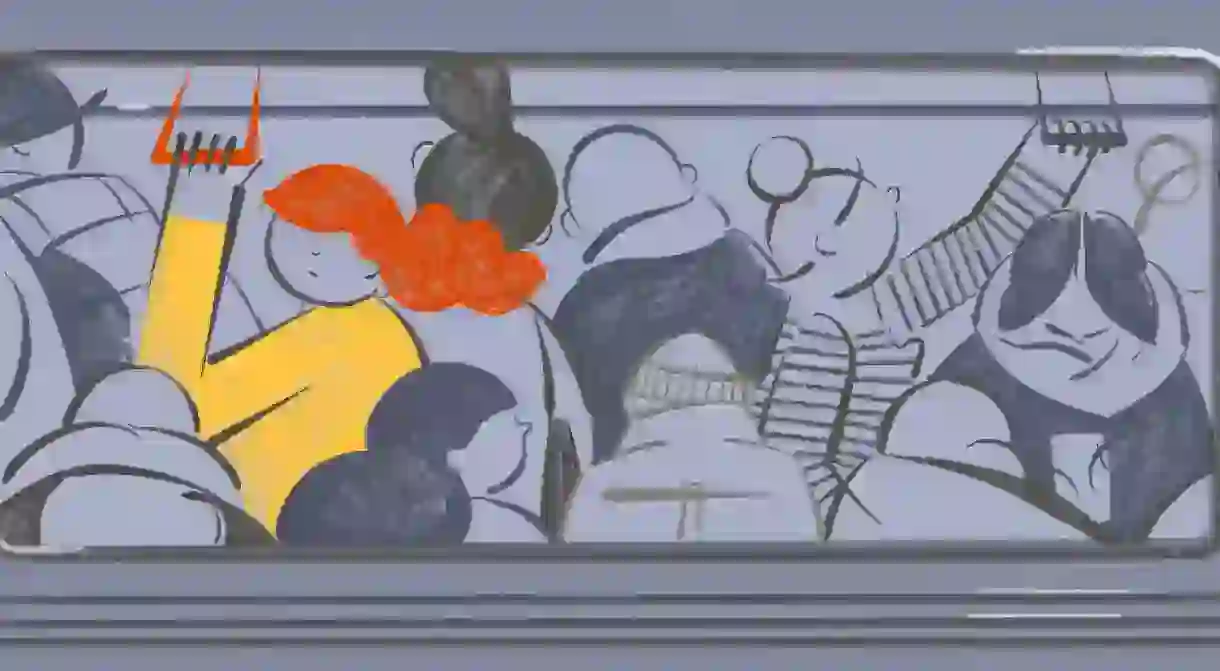A Self-Care Guide to the New York City Subway

Imagine it’s 7:50am on Monday. You’ve managed to make it to the subway platform in time to beat the long line at the coffee shop near your job and arrive at work with 30 minutes to spare. That’s when, as you stand there waiting for the four train to arrive, you hear a monotone voice echoing through the station with the dreaded announcement…
“Southbound two, three, four, and five trains are not in service due to an earlier incident. Please allow extra travel time.”
The frustration that ensues after that message inevitably sets the tone for the rest of your day. And, if you experience similar inconveniences often enough, they can take a serious toll on your mental health.
“Regular subway commuting is not traumatic like being stuck in a tunnel can be, but it can become a daily hassle,” says licensed clinical psychologist Dr. Melanie Greenberg. “Daily hassles are not earth-shattering in themselves, but can accumulate over time to cause a chronic stress response.”
Few things are more quintessentially New York than the city’s illustrious subway system. Like most other things in the Big Apple, the subway is as famous as it is unpredictable. On any given day, delays, crowding, and interesting personalities (to say the least) are just par for the course.

So what can you do to prevent descending into chronic stress? Here are some tips on how to practice self-care when you encounter the day-to-day stresses of New York City subway life.
Prepare, prepare, prepare
The subway is notoriously temperamental. So anticipating possible inconveniences and being as prepared for them as possible is a great approach. Arrive at the station early. Make sure you have a bottle of water or a snack. Wear layers in case the subway gets too hot or is too packed.
Just do everything within your control to make the things that are out of your control less stressful.
Meditate
Overcrowded subway trains and platforms can become overwhelming. To offset the stress that naturally occurs in tight spaces surrounded by people, Dr. Jodi Ashbrook, life coach and founder of “The Yoga Movement,” suggests short, guided meditations for beginners.
“I encourage my clients in these situations to tune in to a short guided meditation to refocus their mindset, gain clarity and get inspired and/or decompress from their day,” Ashbrook says.
Utilize the time wisely
Train delays don’t have to mean a loss of productivity. Take the time to jot down your to-do list for the day or, if you’re on your way home, a grocery list for when you finally do arrive at your destination. The worst thing you can do is sit in a frustrating situation and repeat over and over in your head that the situation is frustrating.
“Use the time to your advantage. Read a book, catch up on Netflix, listen to music, listen to positive mindset affirmations, learn a language, anything to distract from the reality of the space you’re in,” says certified health coach Gee Foottit.
Let go of things that aren’t in your control
Is it really worthwhile to replay how things could’ve been, had your subway been on time? Once you’re late, you’re late. Train delays are out of your control. Try to accept that fact and move on with with more positive thoughts about the coming day.
Just breathe
Sometimes all it takes is a short breathing exercise to refocus in moments when anxiety is trying to take over. Dr. Greenberg suggests low, deep breaths to help calm you and help lower your blood pressure in the moment.
“If you start getting anxious, take deep belly breaths,” suggests Greenberg. “This recruits your parasympathetic nervous system to ‘put on the brakes’ physiologically.”













